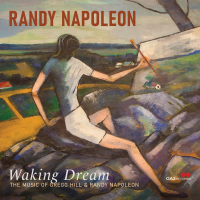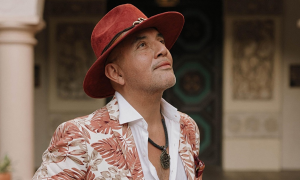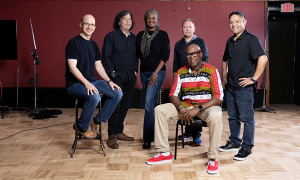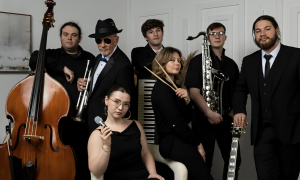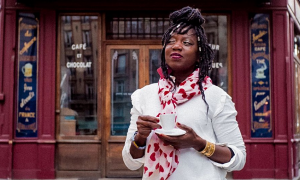Home » Jazz Articles » Take Five With... » Take Five With Dave Scoven
Take Five With Dave Scoven
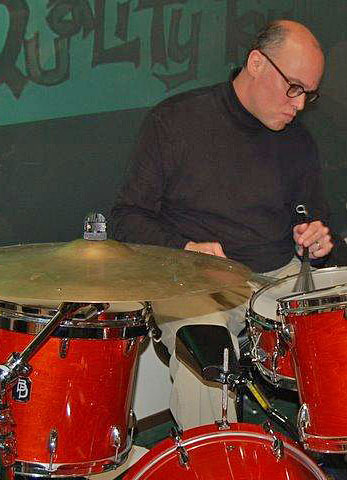 Dave Scoven is an avant-garde composer/percussionist from Richmond, Virginia. Dave released Drum set Meditations: Solo Compositions for Film and Dance in July, 2011. Drum set Meditations is a collection of 15 spontaneous solo compositions for drums and percussion. The compositions are themselves rhythmic meditations, influenced primarily by rhythms and tones from Eastern and South-Central Asia—northern India, Japan, China and Tibet.
Dave Scoven is an avant-garde composer/percussionist from Richmond, Virginia. Dave released Drum set Meditations: Solo Compositions for Film and Dance in July, 2011. Drum set Meditations is a collection of 15 spontaneous solo compositions for drums and percussion. The compositions are themselves rhythmic meditations, influenced primarily by rhythms and tones from Eastern and South-Central Asia—northern India, Japan, China and Tibet.Dave also plays drums in the improvisational jazz/world fusion duo Tele-Phonic, currently lives in Richmond, VA, and performs solo concerts whenever possible.
Instrument(s):
Drums, percussion.
Teachers and/or influences?
I study periodically with

Billy Martin
drumsb.1963
My musical influences are really so expansive, but,

Miles Davis
trumpet1926 - 1991

John Coltrane
saxophone1926 - 1967

Thelonious Monk
piano1917 - 1982

Eric Dolphy
woodwinds1928 - 1964

Cecil Taylor
piano1929 - 2018

Philip Glass
composer / conductorb.1937
I knew I wanted to be a musician when...
My god, I have no idea. Forever. I've always be moved in the deepest way by music. I guess you could say that I knew I wanted to actually be a musician when I was 10 years old or so, and I realized that I had the capacity for endless practicing. I guess I knew then that nothing could hold my attention like playing and practicing—it's still something I love to do. It's cathartic for me. It always has been. The world could be falling in around me, and I wouldn't care. I'd just stay focused. It's free therapy, I guess.
Your sound and approach to music:
I'm big on tone. The sound of the instrument—any instrument—is emotive. A lot of times it isn't even so much what you play; it's the sound you make—if that makes any sense. So by the same token, I'm with John Cage on the value of silence. My approach is definitely minimalism. I'm most proud of what I didn't play. I think that comes from a respect for the music.
The desire to make the music feel good, feel right—that's always been my motivation. I don't care at all about impressing anyone with chops—not that great technique isn't important, because it is—it's just that I come from a place where I'm not playing "technique," I'm playing music. That's a big difference. If you want to hear a drummer who is an absolute master at what I'm talking about, listen to

Joey Baron
drumsb.1955
Your teaching approach:
I don't teach that much. It's been years, really. But when I teach, I teach two things—three, really. Creativity, fundamentals, and more fundamentals. Say what you want, being able to read really well is important. And not just for guys who are going to make a living doing musicals or jingles. A great example of what I'm talking about—look at a guy like

Kenny Wollesen
drums
Bill Frisell
guitar, electricb.1951
Like I said, being able to read music is super-important, but nothing is worse than listening to a bunch of people who sound like they are reading. I can't tell you how miserable it is for me to be in a situation, either playing or in the audience—and don't get me wrong, it's definitely possible to read while performing and not sound like it. But a real pet peeve of mine is to play with people—like if you're playing standards—and you know damn well the other guys have played "Autumn Leaves" six million times before—but it sounds like everyone is sight reading the tune for the first time. I just wanna scream.
Here's my thing—if you can't make the music your own, why should anyone pay to hear you?
Your dream band:
Oh, man. Where to begin. If I could play with Bill Frisell just one time before I die, I'd have lived a perfect life. Are ya listening, Bill???
I also just discovered this absolutely amazing musician named Alisa Apreleva. Her music moves me in a way that's really rare. I'd absolutely love to work with her.
Road story: Your best or worst experience:
Road stories. Boring, right?
Your favorite recording in your discography and why?
I've just released two recordings, back-to-back. First, Drum set Meditations" then, right after, the Tele-Phonic CD, Conversations. Pretty different recordings, ideas, etc. I love them both.
The first Jazz album I bought was:
Kind of Blue. Wasn't that everyone's first jazz album?
What do you think is the most important thing you are contributing musically?
I'm really an advocate for improv—spontaneous composition—free expression. You'd be totally surprised at the number of musicians who are just not down with that as a core concept. Improv for the solo of a structured tune? Sure; but not as a fundamental starting point. I understand that some people are just afraid of things devolving into noise. But, well, one—I think the operative word there is not "noise," the operative word is "afraid." And two—the more you improvise, the better you get. And three—it can sound pretty structured. I hate to blow my own horn, but if you listen to the Tele-Phonic record, those compositions just don't sound like what you think of when you hear the phrase "spontaneous composition."
Now, some of those pieces are structured improv, that's true. But 90% of that album is just what happened when we hit the record button. So improv can be "accessible," if that's important to you. For me, Coltrane's Interstellar Space absolutely blows me away. The music that

Henry Grimes
bass, acoustic1935 - 2020

Rashied Ali
drums1935 - 2009
Did you know...
I have a six year-old son who's an amazing photographer.
CDs you are listening to now:
Alisa Apreleva, Lucidus;

Trilok Gurtu
tablasb.1951
Desert Island picks:
Miles Davis, Kind of Blue; John Coltrane, Giant Steps; Eric Dolphy, Out to Lunch; Bill Frisell, This Land;

Charles Mingus
bass, acoustic1922 - 1979
How would you describe the state of jazz today?
Wow. There's a lot going on and some incredible artists working. If you're plugged in, you can experience some great music. But it's impossible for musicians coming up. There simply is no place to play, and most of the jazz audience out there only wants to hear the famous guys. The number of real jazz clubs is dwindling, and it's sad. I'm pretty sure there are more real jazz clubs in France than there are in the entire US. The real jazz club, where people go to hear a performance, as opposed to a place where people go to eat dinner and listen to some nice background music while they chat; that kind of thing is really over, except in New York, Chicago, New Orleans—a few places scattered her and there. Anyway, without real performance opportunities for upcoming musicians, everything dies; you can't get bookings, so you can't get press, you can't promote your record, etc. It's just a hard time for musicians in the US.
What are some of the essential requirements to keep jazz alive and growing?
Again, there have to be venues. But there can't be venues if there's no audience. It just isn't going to happen. Really, the jazz venues we have are closing, or are changing the kinds of acts they book. That makes it impossible for musicians who don't live in the few major markets left. Without jazz clubs, audiences have no chance to be exposed to new things happening in jazz.
What is in the near future?
Well, right now, I'm preparing to do my best to get out there and play; support the records, maybe sell a few even...wish me luck!
Photo Credit
Courtesy of

Dave Scoven
drumsb.1960
Tags
Dave Scoven
Take Five With...
United States
Billy Martin
Miles Davis
John Coltrane
Thelonious Monk
Eric Dolphy
Cecil Taylor
Philip Glass
Joey Baron
Kenny Wollesen
Bill Frisell
Henry Grimes
Rashied Ali
Trilok Gurtu
Charles Mingus
Comments
PREVIOUS / NEXT
Support All About Jazz
 All About Jazz has been a pillar of jazz since 1995, championing it as an art form and, more importantly, supporting the musicians who make it. Our enduring commitment has made "AAJ" one of the most culturally important websites of its kind, read by hundreds of thousands of fans, musicians and industry figures every month.
All About Jazz has been a pillar of jazz since 1995, championing it as an art form and, more importantly, supporting the musicians who make it. Our enduring commitment has made "AAJ" one of the most culturally important websites of its kind, read by hundreds of thousands of fans, musicians and industry figures every month.



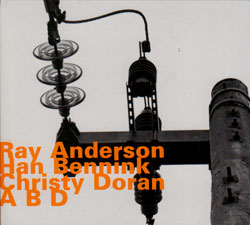



 Buy Now
Buy Now

